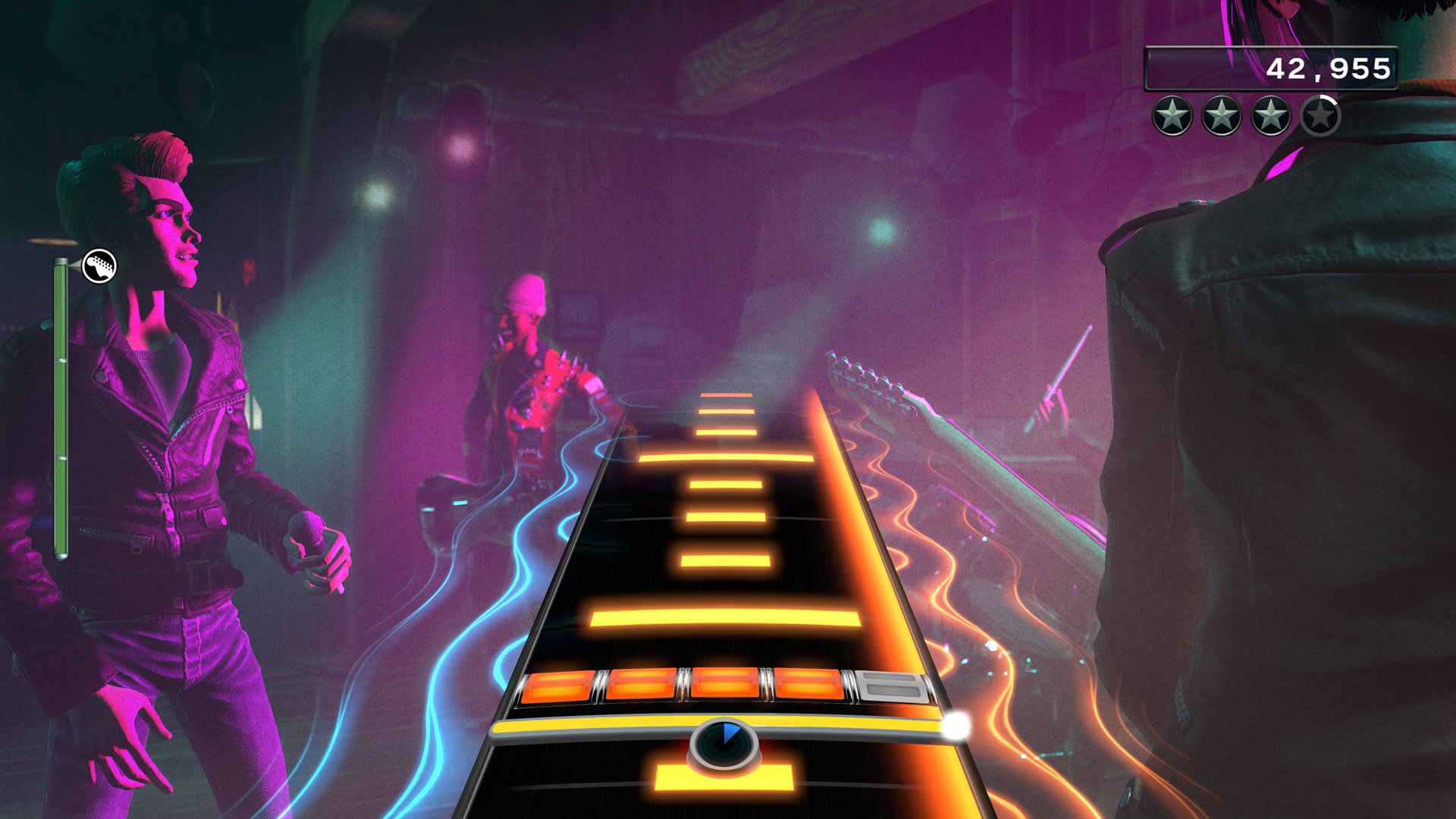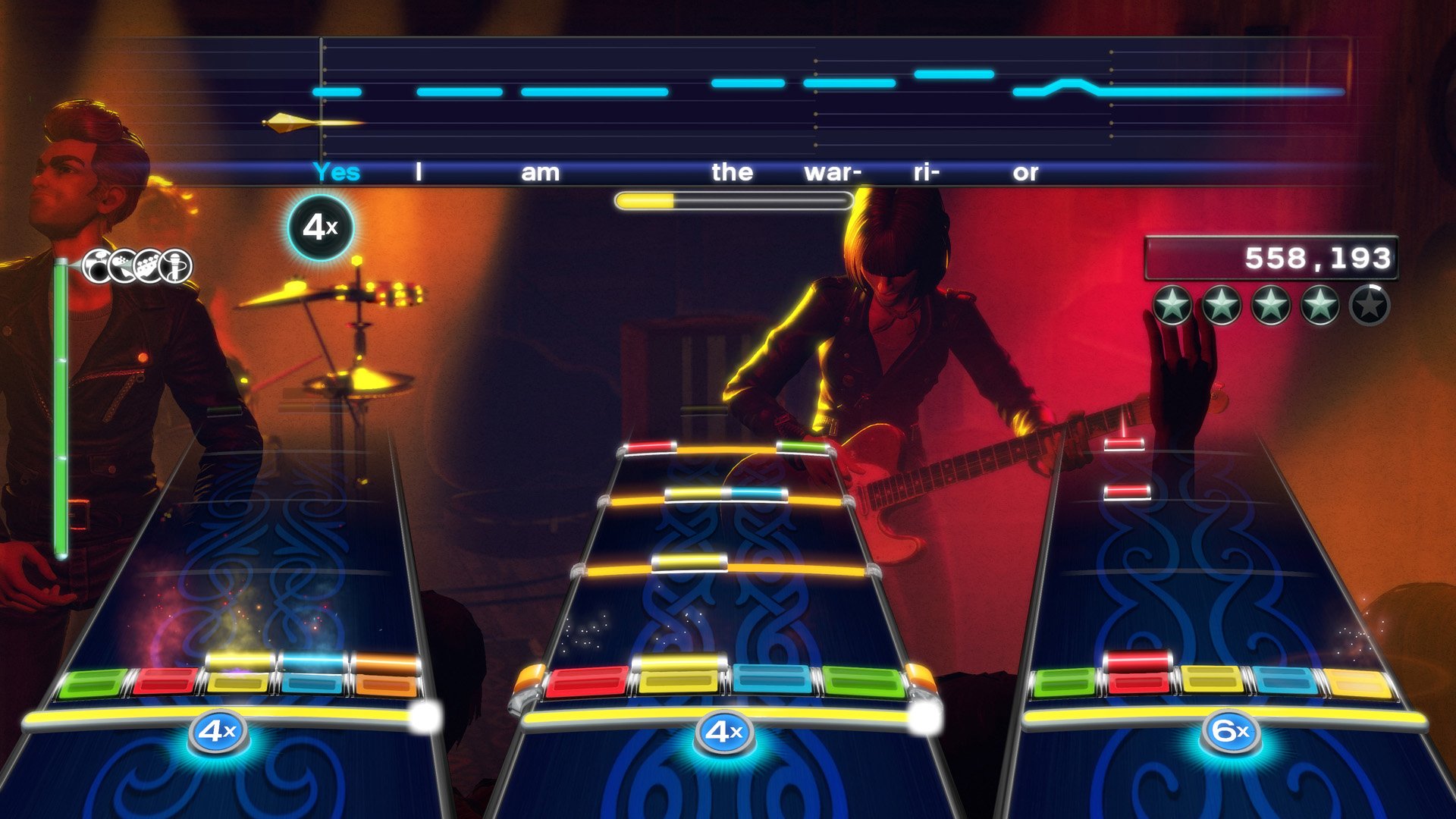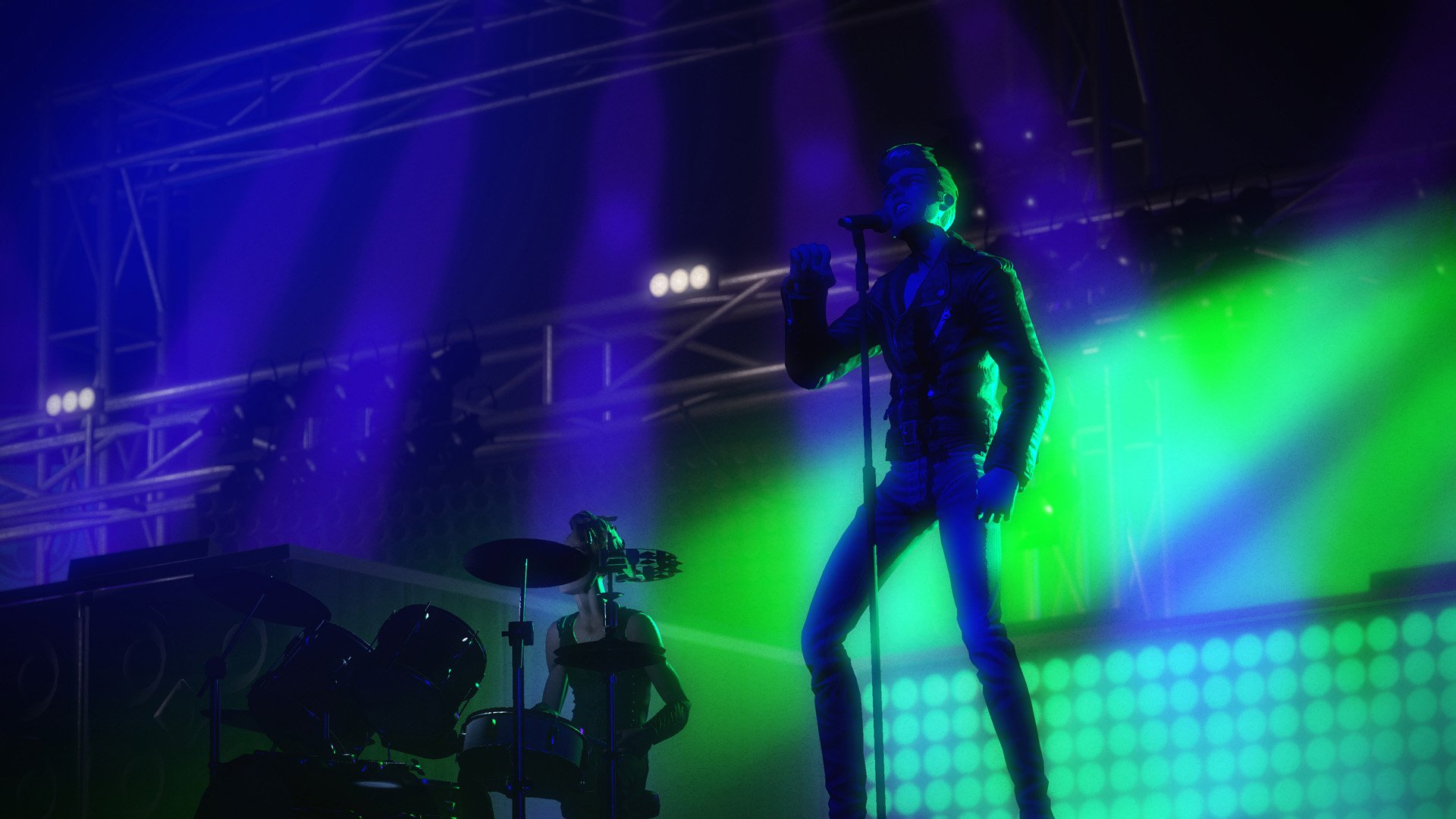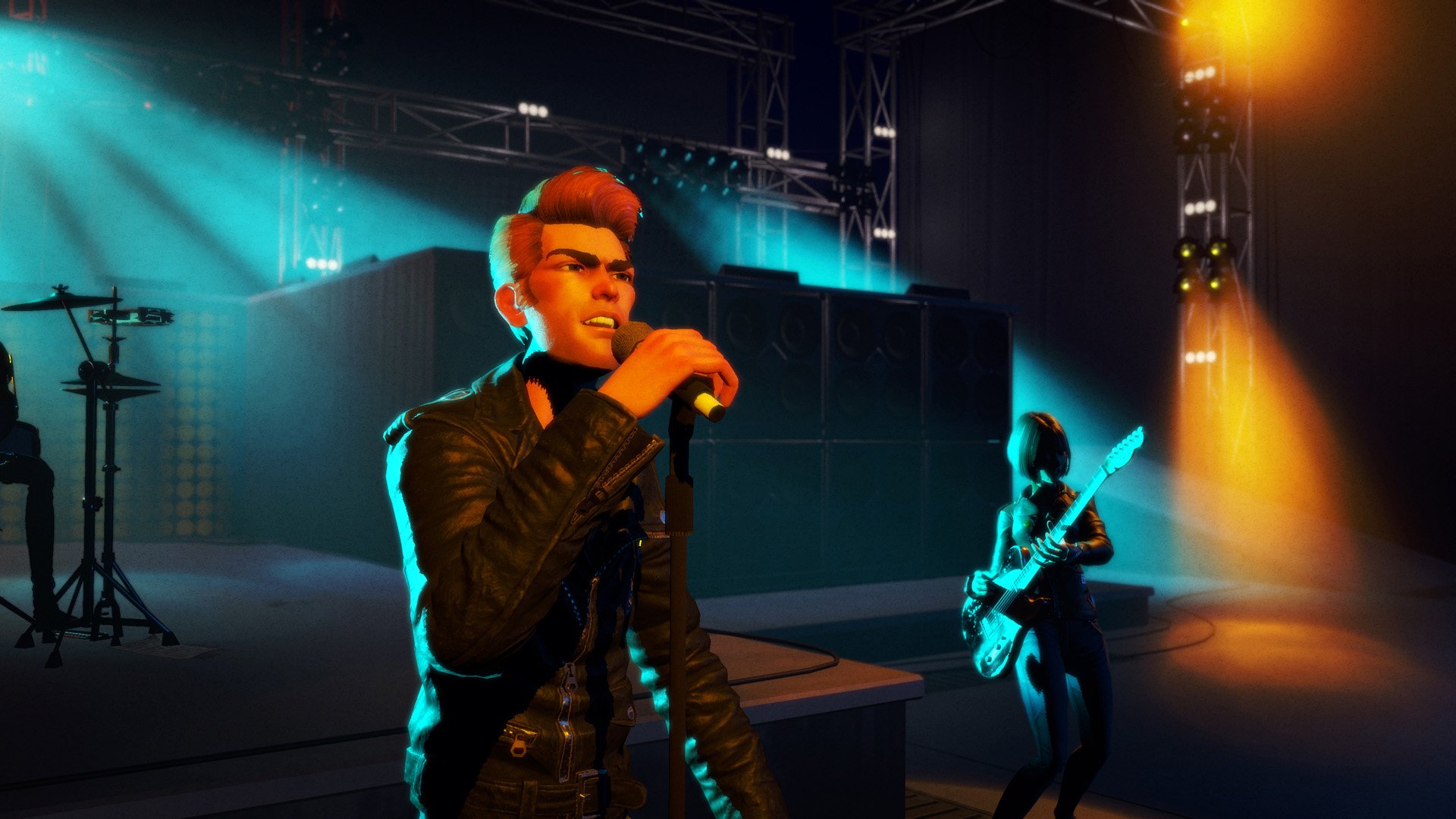Rock Band 4: Still risky, still hard, still Harmonix
The electronic din dissipates as your friends leave, one by one, their voices and fingers tired of the night’s 80s-themed playlist. You round up the instruments (guitars, drums, a microphone with a tangled tail), unplug the cords if they have them, and stick the retired band in a corner. Rock Band fatigue sets in as you shut the Xbox down, and perhaps you feel like that was enough. For the musicians and game designers at Harmonix, however, the last session never stopped.
“We love the core gameplay that was in Rock Band 3 and we never really stopped tooling around with it,” says Steve Janiak, CEO of Harmonix. “There was a bunch of prototyping that was done right after Rock Band 3.” Where players might see 2010 as the point where Rock Band hit its final and most polished peak, Harmonix sees just another beat in its life work.

The rhythm game’s days of true opulence however, with players massaging ‘Rock Lobster’ out of a plastic keytar in a jammin’ five-piece band, are over. Harmonix just lost staff in 2014 – a year which also shifted Janiak from business veep into the CEO position – and the keyboard peripheral, introduced with Rock Band 3, is being cut entirely for Rock Band 4. “There were some great keys songs in the back catalogue, but I think we chose to focus on the right stuff with Rock Band 4,” says Janiak. “We’re focusing on the parts of the game that are used by the most people. And we’ve really made the game better, I think, in all of the major instruments.” Janiak, who holds Taiko Drum Master close to heart, says instrument usage data made it “really compelling to continue working on the guitar and the drums.”
Rock Band 4, due on October 6, is trying to capitalize on new players coming to Xbox One and PlayStation 4. Even with a new audience, however, it hasn’t gotten any easier to get the game’s guitars, drums and microphones out there. They have to be manufactured and shipped to stores, where they take up an enormous amount of space, essentially making Rock Band 4’s footprint in GameStop that much larger and that much harder to secure. They're also really expensive, with a Rock Band 4 package of new instruments, with just one guitar, going for a steep $250 on Amazon.
“There is a lot more retail, places like Amazon have unlimited shelf space, that’s useful,” Janiak says, “but yeah, it’s still pretty complicated, pretty hard, pretty risky to do a big game like Rock Band 4. But we love it.”

Harmonix is also armed with a sobering recollection of its last peripheral-driven passion project, Disney Fantasia: Music Evolved, which it developed exclusively for the Xbox One and its Kinect camera. The vibrant motion-and-rhythm game connected with critics more than consumers, largely because of Kinect’s decoupling from Microsoft’s all-in-one mothership, Janiak says. “Honestly, I think the biggest thing with Fantasia is just the unbundling of Kinect. If every single Xbox One was able to access Fantasia, we probably would have gotten a better response to it. The people who have played it really liked it, so that’s good, we’re happy about that. I think essentially relying 100 percent on folks to buy a camera is not really something we expected would happen.”
Rock Band 4 is getting new, more refined instruments at a price, but they’re optional - Harmonix isn’t betting everything on a new piece of hardware again, and is working closely with Microsoft and Sony to ensure every old instrument is A-OK for another rocking session. “There are a lot of old instruments out there,” Janiak says, summoning the image of blue, red, green, orange and yellow buttons just waiting in dark closets all over the world. “There’s no camera hurdle, and hopefully for a lot of folks there won’t be an instrument hurdle.”
Weekly digests, tales from the communities you love, and more

Fantasia imparted something else, too, by inspiring Rock Band 4’s biggest new feature. Freestyle Guitar Solos, like the “Manipulator” segments in Disney’s vibrant game, lets you warp a song in a way that feels at once experimental, wild and just a tad authorial. “We actually had some grander plans for how to do that in the manipulators,” Janiak says. ”We weren’t able to quite pull off exactly what we wanted to do, we didn’t quite have the tech to do that.” In Rock Band 4, however, guitar solos strike a balance between tricky mechanical input with just enough room in the music’s margins to let you flail. “With our new engine we’re actually to really able to deliver some of what we hoped the manipulators would be, but in a more compelling form,” he says. “Because it’s awesome to feel like you’re playing a guitar solo. It just feels amazing.”
That electric feeling is just one of the signs Harmonix is following into the new Rock Band, and Janiak himself says he’d be “surprised” if people didn’t still crave it. “I don’t really feel like the music game thing went away, ever,” Janiak says. “There’s a new generation of folks that are playing console games. The consoles are selling really well. I think there’ll be folks who feel pretty nostalgic about the times they had playing this game. I really think they’re going to find it, so I feel pretty good about it.”

And what of longtime Rock Band rival, Guitar Hero, which also happens to be coming back? “I think it validates our belief that there is interest in this genre still,” says Janiak, “and that this is a great time to do it.” Guitar Hero Live, which does require new instruments, may just end up illustrating the wisdom of sticking with old plastic.
Most CEOs would tap on a stack of market research papers and data at this point. Janiak, however, talks to me only about what the studio believes in and what feels right. It’s apt sentiment for music games but, as he says, the business is still a risk, even when targeting the overlap of people with new consoles and old instruments. Everyone else faces a steeper incline into Rock Band, though Harmonix would say the climb is worth getting on stage.
Ludwig Kietzmann is a veteran video game journalist and former U.S. Editor-in-Chief for GamesRadar+. Before he held that position, Ludwig worked for sites like Engadget and Joystiq, helping to craft news and feature coverage. Ludwig left journalism behind in 2016 and is now an editorial director at Assembly Media, helping to oversee editorial strategy and media relations for Xbox.



